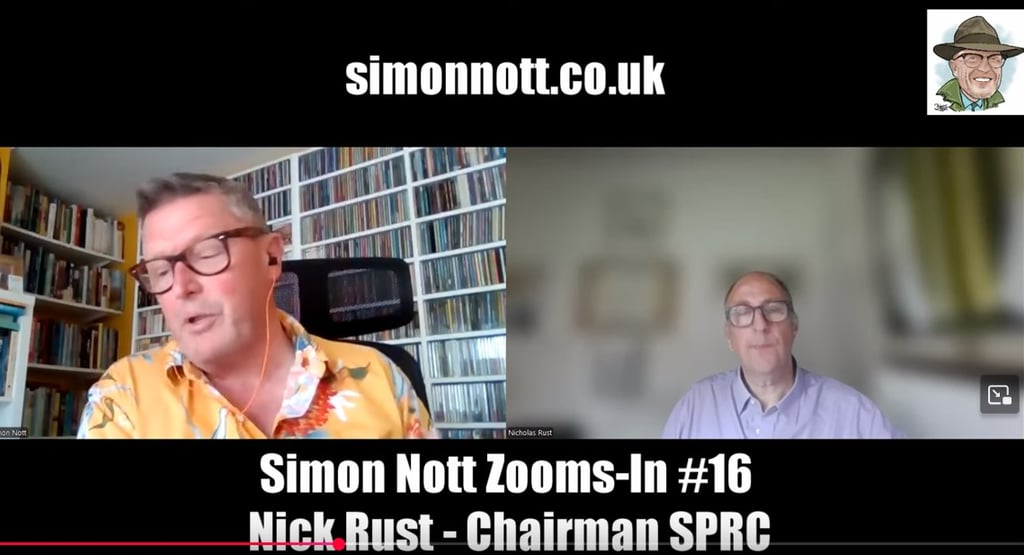The Ex-Bookie Who Guards the Bookies: Is the Starting Price Just a Well-Dressed Cartel?
Simon Nott Zooms In, Nick Rust smiles politely, and we all pretend this isn’t Ladbrokes Invigilating Ladbrokes
Ed Grimshaw
5/31/20254 min read


The Starting Price: Now With Added Corporate Incest
The modern Starting Price (SP), once the bellwether of public betting consensus, has now been repackaged as a digital artefact: algorithmic, austere, and slightly too convenient for the major bookmakers. What used to be bellowed out by men called Barry in flat caps is now calculated by men called Craig in a risk-management team in Milton Keynes. The drama is gone, replaced with a statistical shrug and a glowing PDF.
And who’s in charge of making sure the SP remains fair, balanced, and unsullied by corporate skulduggery?
Step forward Nick Rust, former chief executive of the British Horseracing Authority… and, before that, a longtime Ladbrokes executive. Yes, in a plot twist only British regulation could serve up with a straight face, the ex-bookie is now in charge of monitoring the bookies.
It’s like appointing a retired bank robber to run the vault inspection team—he knows where the cracks are, yes, but he’s also the one who installed them.
Integrity by Committee (Of Bookies)
In Rust’s own words, the SP today is compiled from the prices of seven off-course bookmakers, representing 82% of the market. From this merry band, six are randomly selected each race, their odds diced, sliced, and averaged into the official SP. No independent odds layer, no noisy on-course punter influence—just the internal prices of giant betting corporations, monitoring themselves.
And presiding over this miraculously "independent" process? An ex-bookie with a business-class grin and a remarkable knack for explaining why things that smell of compromise are, in fact, very reasonable.
Rust reassures us the process is “independent of thought” (a phrase so accidentally perfect it deserves an OBE for Satirical Clarity). But isn’t this just a roundabout way of saying the people with skin in the game also run the scoreboard?
He acknowledges there's a “perception issue” with bookmakers now being incentivised to return horses at shorter odds to reduce liabilities. But not to worry: the SPRC has “sophisticated monitoring systems” and a firm belief in the essential goodness of bookmaking giants. It’s the kind of blind faith you’d expect from a man who probably still uses a Ladbrokes mug in his home office.
The Ghost of On-Course Bookies Past
Rust laments the exclusion of on-course bookmakers from the SP calculation. “We’d love to have them back,” he sighs, as if their absence were due to a bout of homesickness rather than the fact that media rights companies no longer pay them for their data. The reality? On-course bookies won’t provide odds unless someone coughs up.
Rust, conveniently, can’t force the media firms to pay. He just chairs the commission. Which, one must admit, is a great gig: all the influence of a watchdog, none of the bite. He spends most of the interview walking a tightrope between sympathetic regulator and industry insider who knows the game too well to blow the whistle.
In truth, it suits the off-course giants just fine that the muddy, ungovernable chaos of the on-course market has been sidelined. And it suits the SPRC, chaired by a man whose pension probably has Coral shares in it, to not rock the boat.
Market Manipulation: Nothing to See Here
Rust insists there’s no funny business going on. The prices are monitored, the system is transparent, and anyone claiming the SP is cooked up after the off is talking “nonsense.” Perhaps. But let’s not pretend that bookmakers returning their own prices without external pressure doesn’t make things suspiciously… efficient.
Remember: these are bookmakers, not Franciscan monks. They exist to win money off you. Every fraction of a point matters. And yet we’re supposed to believe that a market built entirely on internal odds, governed by people with a financial stake in the result, is somehow immune to temptation?
Rust says he hasn’t seen anything “that concerns us in that regard,” which is less reassuring when you consider that, as an ex-bookie, he might be looking through the wrong end of the binoculars.
SP as Benchmark: A Fancy Word for 'Trust Us, It’s Fine'
The modern SP, Rust explains, is less about reflecting the betting public and more about providing a "benchmark"—a reference point for best odds guaranteed offers. That’s £600 million in customer benefit in one year, he says.
Which sounds noble—until you remember that the same companies offering Best Odds Guaranteed are also setting the SP. It's the circular logic of the betting world: “Don’t worry, we’ve given you a good deal on the number we decided amongst ourselves.”
And in charge of overseeing this circular logic? Again, our man Nick Rust, whose CV might as well be laminated in red and white branding.
Final Verdict: Bookmakers Policing Themselves, Led by Their Former Boss
Is the SPRC fit for purpose? If the purpose is to preserve a status quo that benefits large off-course operators, then yes—it’s an efficient, discreet, and cooperative cartel with a moral compass so gently spinning it could pass for a weathervane.
And is Nick Rust the right man? Absolutely—if your goal is to have someone who knows every corporate excuse in the book and can say “independent” while still knowing the internal margins of his former employers better than his children’s birthdays.
But if you were hoping for an actually independent figure—someone with no prior ties to the betting empires whose prices they now enshrine as gospel—then no. Putting an ex-bookie in charge of monitoring the bookies is like putting Alan Sugar in charge of subtlety: fascinating, but fundamentally implausible.
The SP may still be sacred to punters, but let’s not kid ourselves—it’s now run by the very wolves who used to man the tills. And the only thing they’re gambling on is how long the rest of us stay too polite to question it.
